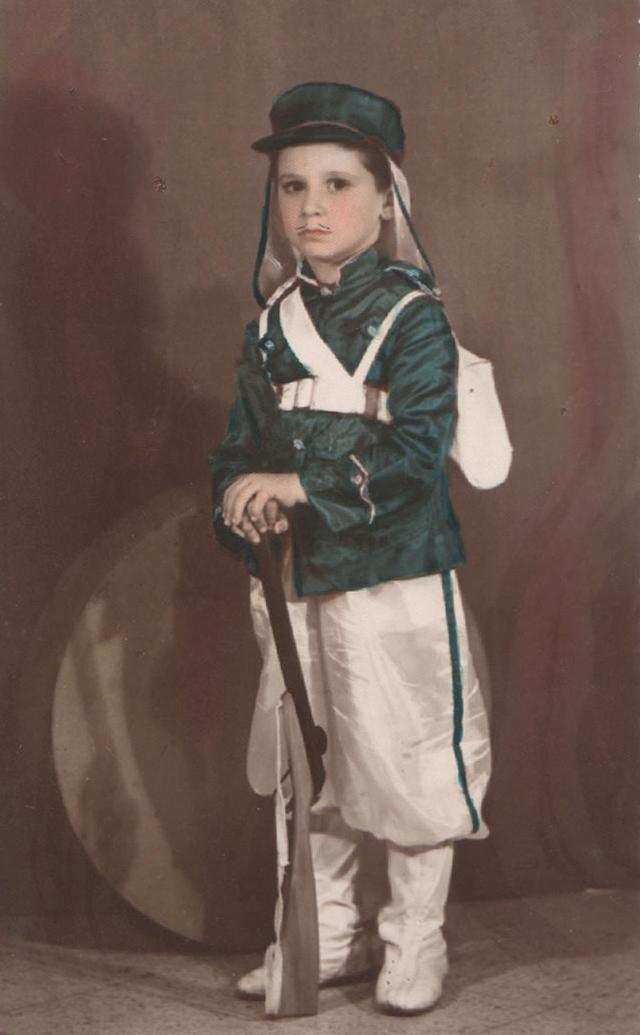
Second French Colonial Empire (19th and 20th Centuries)

Figure 1.--A chastened France launched its second colonial empire in Algeria (1830). This time here would be no major challenge to the British. A mytique soon developed. The Zouave uniforms worn by Amerian Civil War soldiers was one result. France also formed the Foreign Legion which was fromarily deployed in North Africa. It developed mystique of its own. Boys adventures stories were full of Foreign Legion adventures. And they became a popular movie subject. This boy in the early 20th century wears a Foreign Legion uniform. Notice the mostache.
|
|
After the Napoleonic Wars and the Bourbon Restoration in the 19th century, France set about building a new empire. This time there would be no serious challenge to the British Empire. The dominance of the Royal Navy was so total that the French decided to operate within the wold trading system establoished by the British. The new French colonisl empire woild be the second largest in the world. It would be, however, a pale imitation of the British Empire. The blue that colored world maps in competition with British pink, included a huge expanse of barren desert or poor African colonies. And there was no attempt to create a Fracosphere to compete with the British Anglosphere (America, Australia, Canada, New Zealand, and South Africa). The first step was seizing Algeria (1830). The French move into North Africa put a final end to Barbasry Piracy. Tunisia and Morocco followed later. France was also a major player in the late-19th century Scramble for Africa. France had two colonial regions in Africa. Afrique occidentale française (French West Africa--AOF) consisted of eight colonies: Mauritania, Senegal, French Sudan (today Mali), French Guinea, Ivory Coast, Niger, High-Volta (Burkina Faso) and Dahomey ( Benin). Afrique Équatoriale française (French Equitorial Afric--AEF) included four colonies: Gabon, Middle Congo (Republic of Congo), Oubangui-Chari (Central African Republic) and Chad. The AEF had less infrastructures than AOF because of the equatorial forest, but especially because there are less raw materials. France also acquired Indo-China and Pacific island colonies. One of these was New Caledonia (1853). The French colonies plasyed a role in World War I, but not as importasnt as the British Domimnions and utlimately America. After World War I, France acquired two League of Nations mandates in the Middle East--Lebanon and Syria. The NAZIsllowed Vichy to retain control of the French colonies, but they soon came undert attack from the Free French and British. The first Anglo-American offensive of the War was launched at French North Africa--Operation Torch (November 1942). After World War II, France attempted to piece together its empire, but fought two disasterous colonial wars (Viet Nam and Algeria). The second in Algeria almost tore France apart.
Overview
After the Napoleonic Wars and the Bourbon Restoration in the 19th century, France set about building a new empire. This time there would be no serious challenge to the British Empire. The dominance of the Royal Navy was so total that the French decided to operate within the wold trading system establoished by the British. The new French colonisl empire woild be the second largest in the world. It would be, however, a pale imitation of the British Empire. The blue that colored world maps in competition with British pink, included a huge expanse of barren desert or poor African colonies. And there was no attempt to create a Fracosphere to compete with the British Anglosphere (America, Australia, Canada, New Zealand, and South Africa). The French colonies plasyed a role in World War I, but not as importasnt as the British Domimnions and tltimately America. The NAZIs allowed Vichy to retain control of the French colonies, but they soon came undert attack from the Free French and British. The first Anglo-American offensive of the War was launched at French North Africa--Operation Torch (November 1942). After World War II, France attempted to piece together its empire, but fought two disasterous colonial wars (Viet Nam and Algeria). The second in Algeria almost tore France apart.
Geographic Regions
North Africa
The first step was seizing Algeria (1830). The French move into North Africa put a final end to Barbasry Piracy. Tunisia and Morocco followed later.
Sub-saharan Africa
France was also a major player in the late-19th century Scramble for Africa. France had two colonial regions in Africa. Afrique occidentale française (French West Africa--AOF) consisted of eight colonies: Mauritania, Senegal, French Sudan (today Mali), French Guinea, Ivory Coast, Niger, High-Volta (Burkina Faso) and Dahomey ( Benin). Afrique Équatoriale française (French Equitorial Afric--AEF) included four colonies: Gabon, Middle Congo (Republic of Congo), Oubangui-Chari (Central African Republic) and Chad. The AEF had less infrastructures than AOF because of the equatorial forest, but especially because there are less raw materials. The most important French African colony was Senegal and it was ghere the French had the lasrgest presence.
Southeast Asia
France also acquired Indo-China.
Oceania
The French were also active in Oceanoa. One of these was New Caledonia (1853).
Middlle East
After World War I, France acquired two League of Nations mandates in the Middle East--Lebanon and Syria.
HBC

Navigate the Boys' Historical Clothing Web Site:
[Return to the Main French colonialism page]
[Return to the French regional page]
[Return to the Main French history page]
[Introduction]
[Activities]
[Biographies]
[Chronology]
[Clothing styles]
[Countries]
[Essays]
[Bibliographies]
[Contributions]
[FAQs]
[Glossaries]
[Images]
[Links]
[Registration]
[Tools]
[Boys' Clothing Home]
Created: 6:23 AM 7/23/2009
Last updated: 9:12 PM 7/7/2010



